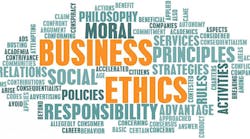A new study, “The Fight Against Corruption: Insights Into Ethical Performance in Global Supply Chains” found that the world’s average business ethics score is 42.4, which indicates most organizations are taking a reactive, unstructured approach to fighting corruption risks. Corruption is defined broadly under the EcoVadis methodology as any kind of abuse of entrusted power in the workplace for private gain, taking the form of bribery, conflict of interest, fraud and/or money laundering.
“While most companies formalize anti-corruption policies through a code of conduct, few are taking the next step and implementing internal control measures,” said Pierre-Francois Thaler, Co-CEO of EcoVadis
“Written frameworks are a great starting point, but they are not sufficient for mitigating all corruption risks, which can wreak havoc on companies’ bottom lines and reputations if not addressed. To tackle these issues effectively, executive leaders need to deploy a holistic and structured risk mitigation program that fosters transparency, encourages collaboration on performance improvements, and holds all parties accountable.”
A new study by EcoVadis, based on more than 20,000 company assessments conducted by from January 2017 to June 2018, across 100 countries and 150 industries. Corruption is defined broadly under the EcoVadis methodology as any kind of abuse of entrusted power in the workplace for private gain, taking the form of bribery, conflict of interest, fraud and/or money laundering.
Study highlights include:
- North American and European companies are leading the world in business ethics with scores above 45, indicating they are the most proactive and structured when dealing with business ethics issues. 56 percent of companies in North America and 51% in Europe have a formal policy on corruption, likely due to respective regulatory environments that bring greater scrutiny, disclosure obligations and penalties.
- The business community needs to take a closer look at mitigation best practices. There is widespread disparity between methods used to fight corruption. Whistleblowing is the most common best practice, followed by anti-corruption training and audits of internal controls. Other fundamental measures are still rare, such as corruption risk assessments, with only four percent of companies in both North America and Europe implementing this practice – and just two percent in China, Latin America and AMEA.
- Reporting on business ethics issues is still very rare. On average, less than 10% of companies globally report on business ethics KPIs. This figure is slightly higher for North American companies (12%).
- Finance and insurance (49.9) is the leading industry in best practices adoption. Power transmission and generation (50.2) had the highest average industry score followed by information and communication technology (47.7), real estate (47.7) and legal and consulting (46.4) industries.
Wholesale, transportation and storage, construction and the light and heavy manufacturing sectors all scored below the world’s average (42.2), indicating these industries are at high risk for corruption, bribery and fraud.
The timing of the study coincides with the new U.S. Foreign Corrupt Practices Act policies and expansion of Sapin II in France, which requires companies with more than 500 employees and €100 million in annual turnover to implement anti-corruption programs. Since enacting the law, French companies’ performance has increased significantly when it comes to policies (with adoption of this practice jumping from 44% to 49%) and measures (adoption increased from 30% to 36%) and moderately on reporting results (adoption moved up from 11.8 to 12.5 percent).
Corruption is defined broadly under the EcoVadis methodology as any kind of abuse of entrusted power in the workplace for private gain, taking the form of bribery, conflict of interest, fraud and/or money laundering.



